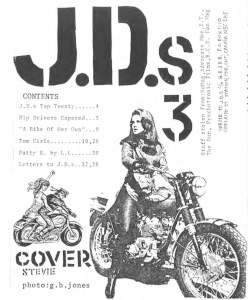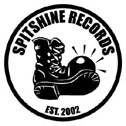Related Research Articles
Queercore is a cultural/social movement that began in the mid-1980s as an offshoot of the punk subculture and a music genre that comes from punk rock. It is distinguished by its discontent with society in general, and specifically society's disapproval of the LGBT community. Queercore expresses itself in a DIY style through magazines, music, writing and film.

A punk zine is a zine related to the punk subculture and hardcore punk music genre. Often primitively or casually produced, they feature punk literature, such as social commentary, punk poetry, news, gossip, music reviews and articles about punk rock bands or regional punk scenes.
Anti-Scrunti Faction were an American queercore punk trio from Boulder, Colorado, United States.
Tribe 8 was a lesbian punk rock band from San Francisco, considered one of the first queercore groups. The band took their name from the practice of tribadism, with "tribe eight" being a play on the word tribade, a sexual practice sometimes also known as "scissoring."

Thomas Daniel Jennings is a Los Angeles-based artist and computer programmer, known for his work that led to FidoNet, and for his work at Phoenix Software on MS-DOS integration and interoperability.
Chainsaw Records is an independent record label run by Donna Dresch that is devoted to Queercore bands. The label is in Portland, Oregon.
Outpunk enjoys the distinction of being the first record label entirely devoted to queer punk bands.

J.D.s was a Canadian queer punk zine which started in 1985 and ran for eight issues until 1991. The zine was co-authored by G.B Jones and Bruce LaBruce and is credited as being one of the first and most influential queer zines. The zine's content was centred around anarchic queer-punk themes and heavily discussed queer-skewed punk music from the late 1980s.
Sta-Prest was a multi-racial queercore and riot grrrl band from San Francisco that was active in the 1990s. The group members included Aloofah and D.M. Feelings.

Mr. Lady Records was a San Francisco-based lesbian-feminist independent record label and video art distributor. Artists on the label included Le Tigre and The Butchies. OutSmart magazine noted that Mr. Lady was "queercore's strongest label."
Aaron Detroit is an American musician, zine writer and music journalist. He was first recognized as a zine writer during his mid-teens in 1992.
Donna Dresch is an American punk rock musician, perhaps best known as founder, guitarist and bass guitarist of Team Dresch.
Fanorama is a Rhode Island–based zine and zine-distro produced by journalist/activist REB. According to their website it is the "grand-daddy of the queer zine scene".
Leslie Mah is an American musician and performer.

Best Revenge was a queercore punk band from Los Angeles. They were active as a studio and live act from the beginning of 1998 until December 2002.

Martin Sorrondeguy is the singer of American hardcore punk bands Los Crudos and Limp Wrist, the founder of the DIY record label Lengua Armada Discos, and a prominent figure in both the straight edge scene and the queercore scene. He currently does vocals in the band Needles.

Homocore was an American anarcho-punk zine created by Tom Jennings and Deke Nihilson, and published in San Francisco from 1988 to 1991. One of the first queer zines, Homocore was directed toward the hardcore punk youth of the gay underground. The publication has been noted for popularizing the queercore movement on the United States west coast.
G. B. Jones is a Canadian artist, filmmaker, musician, and publisher of zines. She is best known for producing the queer punk zine J.D.s and her Tom Girls drawings.

Spitshine Records was a Venice, California-based independent record label specializing in independent punk rock and queercore music. The label was co-founded in 2001 by Ryan Revenge and Bilito Peligro of the queercore band Best Revenge. They founded the label to release music by Best Revenge but turned their attention to documenting music made by queercore bands in Los Angeles in the late 1990s/early 2000s.
Fagatron was a short-lived but influential punk rock band in the Queercore movement which gained a small cult following for its emphasis on radical politics and queer identity. It was formed in 1996 by Abe Miner and Jeromy Ogg of Lincoln, Nebraska.
References
- ↑ Elash, Daniel Frontino (2006), Comrades In Arms: from the Deke Nihilson Archives, archived from the original on December 10, 2008, retrieved November 26, 2008
- 1 2 Wiedlack, Katharina (2015). Queer-feminist punk : an anti-social history. Vienna: Zaglossus. pp. 35–36. ISBN 9783902902276.
- ↑ Wiedlack, Maria Katharina (2013). ""To Sir With Hate:" A Liminal History of Queer-Feminist Punk Rock". "We're Punk as Fuck and Fuck like Punks:" Queer-Feminist Counter-Cultures, Punk Music and the Anti-Social Turn in Queer Theory (Ph. D.). Universität Wien. p. 28. S2CID 191732847.
- ↑ Marks, Laura U. (March 1996). "Straight women, gay porn, and the scene of erotic looking". Jump Cut: A Review of Contemporary Media (40): 127–135. Retrieved November 17, 2020.
- ↑ Grant, Jess (February–March 1993), Love and Rage , retrieved November 11, 2008
- ↑ LGBTQ America today : an encyclopedia. Westport, Connecticut: Greenwood Press. 2009. p. 980. ISBN 9780313339936.
- 1 2 Crass, Chris (2013). Towards collective liberation : anti-racist organizing, feminist praxis, and movement building strategies. Oakland, CA: PM Press. p. 94. ISBN 9781604868470.
- ↑ "Deke Nihilson papers". Online Archive of California. Retrieved November 17, 2020.